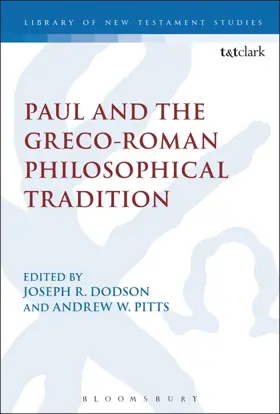

Paul and the Greco-Roman Philosophical Tradition
in Library of New Testament Studies
Pages
288
Publisher
T&T Clark
Published
8/24/2017
ISBN-13
9780567657916
Paul and the Greco-Roman Philosophical Tradition provides a fresh examination of the relationship of Greco-Roman philosophy to Pauline Christianity and an in-depth look at different approaches currently employed by scholars who draw upon philosophical settings in the ancient world to inform their understanding of Paul. The book is divided into two sections, one consisting of essays that situate Greco-Roman philosophy as a social setting for Pauline Christianity, and one consisting of exegetical studies dealing with various passages where motifs emerging from ancient philosophical culture provide illumination.
The chapters summarize the state of the discussion on Paul's relationship to the Greco-Roman philosophical tradition, examine obstacles to positioning Paul in relation to ancient philosophy, compare different approaches, and compile the diverse methodologies into a single comparative study. It then interrogates several philosophical motifs for the exegetical insights that they may yield when interpreting Paul's letters.
The chapters summarize the state of the discussion on Paul's relationship to the Greco-Roman philosophical tradition, examine obstacles to positioning Paul in relation to ancient philosophy, compare different approaches, and compile the diverse methodologies into a single comparative study. It then interrogates several philosophical motifs for the exegetical insights that they may yield when interpreting Paul's letters.
- Table of contents
- List of Abbreviations
- Notes on Contributors
- Preface
- Foreword: Troels Engberg-Pedersen
- Introduction: Andrew W. Pitts
- 1. Powers, Baptism, and the Ethics of the Stronger: Paul Among the Ancient Political Philosophers - Niko Huttunen
- 2. Paul and (Pan)theism - Runar M. Thorsteinsson
- 3. Bruce Winter and the Language of Benefaction in Romans 13.3 - Andrew W. Pitts and Bahij Ajluni
- 4. Paul and Aristotle on Friendship - Dave E. Briones
- 5. Paul and the Militia Spirituals Topos in 1 Thessalonians - Nijay Gupta
- 6. Divine Causation and Prepositional Metaphysics in Philo of Alexandria and the Apostle Paul - Orrey McFarland
- 7. Early Conceptions of Original Sin - And its Overcoming. Reading Galatians 4.21-31 Through Philo's De Opficio Mundi - Gitte Buch-Hansen
- 8. Gendered Exegesis of Creation in Philo (De Opficio Mundi) and Paul - John Worthington
- 9. Natural Hair: A 'New Rhetorical' Assessment of 1 Cor. 11.14-15 - Timothy Brookins
- 10. Elements of Apocalyptic Eschatology in Seneca and Paul - Joseph R. Dodson
- 11. The Nature of True Worship: Reading Acts 17 with Seneca and Paul, Epistle 95 - Brian J. Tabb
- 12. Death as an Ethical Metaphor in Seneca's Writings and in Paul's Letter to the Romans - Matthias Nygaard
- 13. The Wilderness Tradition in Paul, Wisdom of Solomon, and Hebrews - Madison N. Pierce
- Index of Ancient Sources
- Index of Modern Authors
- Index of Ancient Figures
Inner Books
This physical volume has several internal sections, each of which has been reviewed independently
- Powers, Baptism, and the Ethics of the Stronger: Paul Among the Ancient Political Philosophers by Niko Huttunen
- Paul and (Pan)theism by Runar M. Thorsteinsson
- Bruce Winter and the Language of Benefaction in Romans 13.3 by Andrew W. Pitts and Bahij Ajluni
- Paul and Aristotle on Friendship by David E. Briones
- Paul and the Militia Spirituals Topos in 1 Thessalonians by Nijay K. Gupta
- Divine Causation and Prepositional Metaphysics in Philo of Alexandria and the Apostle Paul by Orrey McFarland
- Early Conceptions of Original Sin - And its Overcoming. Reading Galatians 4.21-31 Through Philo's De Opficio Mundi by Gitte Buch-Hansen
- Gendered Exegesis of Creation in Philo (De Opficio Mundi) and Paul by Jonathan Worthington
- Natural Hair: A 'New Rhetorical' Assessment of 1 Cor. 11.14-15 by Timothy A. Brookins
- Elements of Apocalyptic Eschatology in Seneca and Paul by Joseph R. Dodson
- The Nature of True Worship: Reading Acts 17 with Seneca and Paul, Epistle 95 by Brian J. Tabb
- Death as an Ethical Metaphor in Seneca's Writings and in Paul's Letter to the Romans by Matthias Nygaard
- The Wilderness Tradition in Paul, Wisdom of Solomon, and Hebrews by Madison N. Pierce